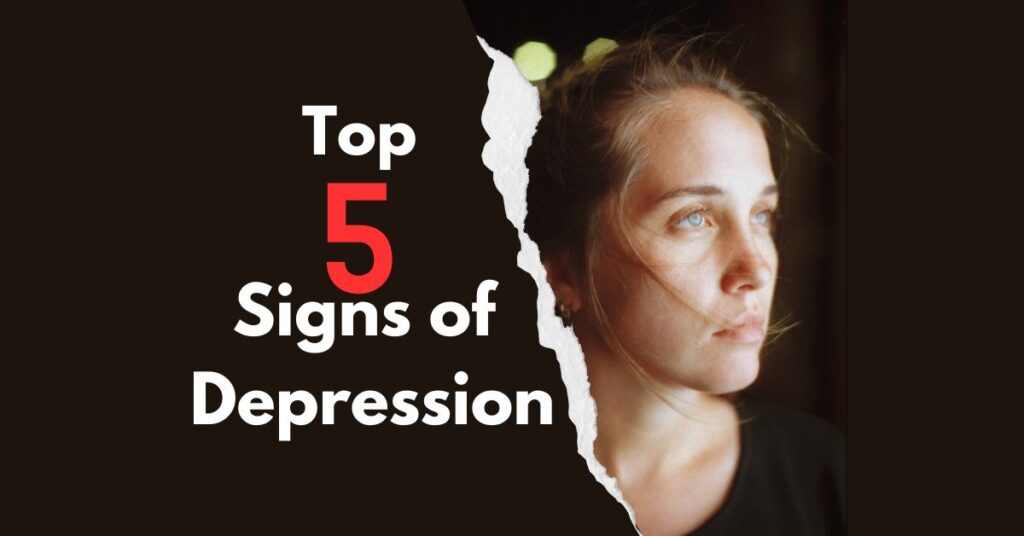
‘Depression is just a phase, it will pass’,’ It is all in your head and a normal part of aging’, ‘Depression is not a real problem, it’s a western concept’, ‘Only people who have faced significant life hardships can develop depression’. We have often heard these statements, and it is time to debunk these myths.
Depression is a universal mental health issue with biological, psychological, and environmental factors contributing to it. It is not a reflection of personal character or strength.
It is estimated that 1 in every 5 people suffer from depression. Though it is treatable, most people don’t seek help because of the stigma. The purpose of this article is to shed light on this topic and bring about awareness for change.
These are the Top 5 signs seen in people with depression:
- Depressed Mood
- Loss of pleasure in daily activities or impairment
- Changes in appetite and sleep
- Loss of energy and fatigue
- Indecisiveness and inability to concentrate
Now let’s take a deeper look at the above signs of depression
- Depressed Mood
One of the most noticeable signs of depression is a consistent and deep shift in a person’s emotional state. Individuals living with depression experience a low mood that sticks around, unlike the regular ups and downs we all experience in life. It’s as if they’re carrying a heavy emotional burden that affects their daily experiences and outlook. These mood changes go beyond the typical feelings of occasional sadness. They often bring a sense of hopelessness and helplessness, making it challenging for those affected to see a brighter future.
People with a depressed mood may experience a range of emotions. This includes a sense of persistent and unshakable sadness that can last for weeks or even months, regardless of specific life events. For some, depression leads to emotional numbness, where they no longer experience joy or pleasure in activities they once enjoyed, causing life to lose its color and vibrancy. Additionally, depression often brings a profound sense of hopelessness about the future, making it challenging for individuals to see a way out of their emotional pain, leading them to believe that things will never improve. Irritability can also be a part of this emotional landscape, as some people with depression become easily frustrated, angry, or agitated, even over minor issues. These emotional experiences are part of the complex and multifaceted nature of depression, and they highlight the need for understanding and support for those affected by this condition.
- Loss of pleasure in daily activities or impairment
Anhedonia, a central feature of depression, is characterized by the inability to find enjoyment or pleasure in activities that were once fulfilling. This profound symptom affects various aspects of an individual’s life, manifesting in multiple ways. Such as withdrawing socially, distancing themselves from friends and family, as once-enjoyable social interactions no longer provide the joy they once did. This emotional numbing can extend to professional and academic life, leading to a lack of motivation and satisfaction, ultimately resulting in reduced productivity and performance. Additionally, cherished hobbies and interests may be abandoned, as they fail to evoke the pleasure and enthusiasm they once did. Anhedonia can also have a notable impact on eating habits, with some individuals overeating in an attempt to compensate for the absence of pleasure, while others may lose their appetite, potentially resulting in weight changes. Furthermore, strained relationships may develop due to the loss of interest in social activities and the emotional detachment that often accompanies anhedonia.
- Changes in appetite and sleep
Noticeable changes in sleep and appetite patterns, which are key indicators of the disorder. Sleep disturbances in depression can take various forms, including insomnia, hypersomnia, early morning awakenings, and irregular sleep schedules. Many individuals with depression struggle to fall asleep due to racing thoughts and anxiety, while others find it difficult to get out of bed in the morning despite prolonged sleep. These sleep disruptions can disrupt daily routines and exacerbate feelings of fatigue and restlessness. Similarly, changes in appetite are prevalent among those with depression. Some may turn to overeating as a coping mechanism, leading to potential weight gain, while others may lose their appetite, resulting in weight loss and malnutrition. Emotional eating, where food is used to alleviate emotional distress rather than hunger, is also common.
- Loss of energy and fatigue
Depression is a multifaceted mental health condition, often marked by profound fatigue and a pervasive loss of energy. Individuals with depression grapple with both physical and emotional exhaustion, depleting their inner reserves and leading to symptoms like extreme lethargy, apathy, physical weakness, impaired concentration, and social withdrawal. Depression saps motivation and makes even the simplest of daily activities seem like monumental tasks. This lack of energy extends beyond ordinary tiredness, as those with depression often wake up after a full night’s sleep feeling just as tired, experiencing unrefreshing sleep and physical discomfort. It leads to a decline in physical fitness, and individuals may curtail their activities due to constant exhaustion. Moreover, this fatigue extends to a loss of enjoyment in once-pleasurable activities, rendering them as burdensome tasks, ultimately affecting their overall well-being. Depression’s toll on energy and vitality underscores the need for early recognition and professional support to alleviate its effects on daily life and emotional well-being.
- Indecisiveness and inability to concentrate
Depression often brings about cognitive challenges, including indecisiveness that makes even simplest choices, such as deciding what to eat for dinner or which clothes to wear a burden, leading to self-doubt, procrastination, and avoidance. Moreover, even after making a decision, individuals with depression may engage in a cycle of second-guessing themselves, plagued by doubts about whether they made the right choice. These cognitive hurdles can significantly affect work, personal life, and overall well-being. Depression also impairs an individual’s ability to focus and concentrate, with racing negative thoughts dominating their thinking, hindering task engagement and memory. This negatively impacts work and academic performance, leading to reduced productivity, increased errors, frustration, and heightened irritability.
Conclusion
In conclusion, amidst the shadows of depression, a glimmer of hope persists, much like an unfinished painting waiting for its transformation. It’s crucial to remember that mental health awareness is the first step towards a brighter future. Just as an artist seeks guidance to refine their craft, seeking professional help is a vital and courageous choice when dealing with depression. With timely assistance and unwavering support, individuals can once again find themselves brushing the vibrant colors of life’s cheerful scenes. Our psychological well-being center Inspiron, alongside its compassionate team of psychologists, stands ready to be the guiding light on this journey toward rediscovering happiness and vitality. We wholeheartedly encourage reaching out, for your well-being is of paramount importance, and you are not alone in this path towards healing.




